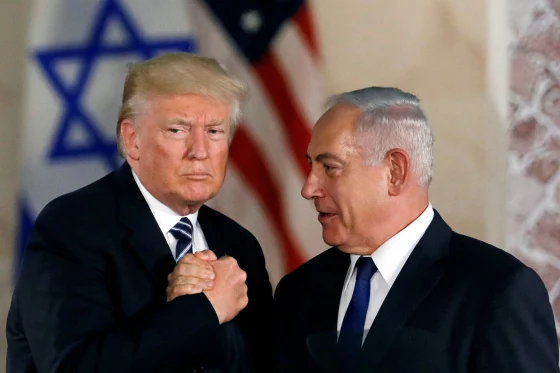
In a highly charged political climate, former U.S. President Donald Trump has once again positioned himself as a key voice in international affairs. This time, his focus is the ongoing Middle East conflict, where tensions between Israel and militant groups have reached a boiling point. Speaking from Washington, Trump issued a bold message to Israeli Prime Minister Benjamin Netanyahu: “Do what’s necessary.” This phrase underscores Trump’s unwavering support for Netanyahu, urging Israel to take strong measures in defense of its security.
As the violence escalates and global leaders call for ceasefires, Trump’s statement injects fresh controversy into an already volatile situation. His remarks have not only captured international attention but also reignited debates across Washington DC news, where policymakers, diplomats, and the media scramble to analyze the implications of Trump’s words.
Trump’s Ties to Israel: A Legacy of Support
Trump’s relationship with Israel has been one of his most defining foreign policy stances, especially during his presidency from 2017 to 2021. His administration’s decision to move the U.S. Embassy from Tel Aviv to Jerusalem remains a milestone, recognized both as a bold diplomatic move and a provocative shift that inflamed tensions in the region. During his tenure, Netanyahu often described Trump as one of the most pro-Israel American presidents in history, a sentiment that resonated strongly with many in Israel.
Now, years after leaving office, Trump continues to publicly voice his support for Israel, offering Netanyahu not only words of encouragement but a tacit endorsement of whatever actions are deemed necessary to ensure Israeli security. His message carries weight as it reflects a broader U.S. political divide, with some factions calling for stronger military intervention and others urging restraint and diplomacy.
A Polarizing Message in Washington
Trump’s statement comes at a time when Washington DC is grappling with the political and humanitarian dimensions of the Middle East crisis. The Biden administration, while continuing to affirm the U.S. commitment to Israel’s right to defend itself, has been more cautious, urging for measured responses and prioritizing the protection of civilian lives on all sides.
As a result, Trump’s direct approach has reignited Washington’s political debates. His supporters see him as a decisive leader who recognizes the importance of strong alliances and effective action. They argue that his message to Netanyahu is a necessary stance to counter threats against Israel and ensure stability in the region. On the other hand, critics argue that Trump’s rhetoric risks escalating an already fragile situation, pushing for solutions that might sideline peace talks and diplomatic efforts.
Washington DC’s political sphere, already highly polarized, now finds itself divided once more over Trump’s role in shaping foreign policy debates, even as a private citizen. For many, his comments serve as a reminder of the sharp contrasts between his administration’s foreign policy and that of President Biden.
The Global Ripple Effect: U.S.-Israel Relations on Display
Trump’s words have also sent ripples through the international community, where leaders are closely watching the U.S.-Israel relationship. Netanyahu, who is facing mounting pressure at home, welcomed Trump’s public endorsement. However, the former president’s comments are likely to complicate diplomatic efforts with nations that have been calling for ceasefires and negotiations.
For many in the Middle East, Trump’s statement is seen as further evidence of U.S. favoritism towards Israel. This perception, especially among pro-Palestinian groups, could lead to increased animosity against U.S. interests in the region. While the U.S. has long maintained a close alliance with Israel, recent administrations have tried to walk a tightrope between supporting Israel’s right to self-defense and advocating for the rights of Palestinians.
In Washington, political analysts are keenly observing how Trump’s remarks may influence U.S. foreign policy moving forward. Will his public support of Netanyahu push Biden to adopt a more hardline stance, or will it force the current administration to double down on diplomacy?
Trump’s Messaging: Election Strategy or Genuine Concern?
As with much of Trump’s rhetoric, there’s speculation as to whether his comments are driven by genuine concern for Israeli security or by his own political ambitions. With the 2024 U.S. presidential election on the horizon, Trump’s involvement in international affairs could be seen as part of a broader strategy to solidify his foreign policy credentials and rally his conservative base.
Washington news today has been filled with reactions from both sides of the political aisle. Republicans have largely supported Trump’s message, praising his directness and focus on strong U.S.-Israel ties. Conversely, Democrats and more progressive factions argue that such rhetoric is reckless and could deepen the humanitarian crisis in the region.
While Trump’s endorsement of Netanyahu may appeal to certain voter segments, it could also alienate those who are calling for a more balanced U.S. approach in the Middle East. His comments, whether intended as campaign fodder or as a genuine call to action, have undoubtedly added complexity to an already multifaceted crisis.
Washington’s Response: Divisions Run Deep
Inside Washington DC, Trump’s comments have sparked debates not only about U.S. foreign policy but also about the broader role America should play in international conflicts. Lawmakers, particularly those on Capitol Hill, are divided over how best to approach the Middle East crisis. Some believe that the U.S. must stand unequivocally behind Israel, while others push for greater focus on humanitarian aid and conflict resolution.
The Washington Commanders news network and other outlets covering Washington daily news have been inundated with panel discussions, op-eds, and interviews dissecting the former president’s remarks. Many wonder whether Trump’s influence on U.S. foreign policy, despite being out of office, remains stronger than previously thought.
Furthermore, as Washington DC breaking news today shifts its attention to the evolving situation in Israel, the city’s diplomats and think tanks will likely continue grappling with Trump’s latest intervention.
The Road Ahead: Middle East Conflict and U.S. Leadership
As the Middle East conflict continues to escalate, Trump’s words will likely echo through both U.S. and Israeli political corridors. His call for Netanyahu to “do what’s necessary” may be embraced by some as a necessary stance for Israel’s survival, but it could also ignite further tensions in a region already rife with conflict.
In Washington, the future of U.S.-Israel relations, and the broader role America will play in the Middle East, remains a deeply contentious issue. As politicians, diplomats, and citizens reflect on Trump’s latest foray into international politics, the country faces difficult decisions about how to navigate its role in one of the most enduring global conflicts.
Whether Trump’s strong support for Netanyahu will resonate with voters or further polarize an already divided nation remains to be seen. But for now, Washington’s focus is on how to balance its diplomatic goals with its longstanding alliance with Israel—and what that means for peace in the Middle East.





